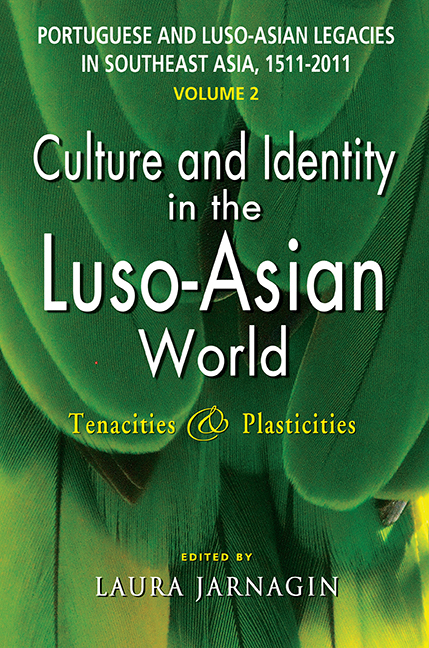 Portuguese and Luso-Asian Legacies in Southeast Asia, 1511-2011, vol. 2
Portuguese and Luso-Asian Legacies in Southeast Asia, 1511-2011, vol. 2 Book contents
- Frontmatter
- Contents
- List of Figures and Tables
- Preface
- List of Contributors
- Glossary
- Introduction: The Qualitative Properties of Cultures and Identities
- Part One Crafting Identity in the Luso-Asian World
- Part Two Cultural Components: Language, Architecture and Music
- 5 The Creole-Portuguese Language of Malacca: A Delicate Ecology
- 6 Oral Traditions of the Luso-Asian Communities: Local, Regional and Continental
- 7 Verb Markings in Makista: Continuity/Discontinuity and Accommodation
- 8 From European-Asian Conflict to Cultural Heritage: Identification of Portuguese and Spanish Forts on Ternate and Tidore Islands
- 9 The Influence of Portuguese Musical Culture in Southeast Asia in the Sixteenth and Seventeenth Centuries
- Part Three Adversity and Accommodation
- Appendix: Maps
- Bibliography
- Index
- Titles in the Nalanda-Sriwijaya Studies Centre Series
5 - The Creole-Portuguese Language of Malacca: A Delicate Ecology
from Part Two - Cultural Components: Language, Architecture and Music
Published online by Cambridge University Press: 21 October 2015
- Frontmatter
- Contents
- List of Figures and Tables
- Preface
- List of Contributors
- Glossary
- Introduction: The Qualitative Properties of Cultures and Identities
- Part One Crafting Identity in the Luso-Asian World
- Part Two Cultural Components: Language, Architecture and Music
- 5 The Creole-Portuguese Language of Malacca: A Delicate Ecology
- 6 Oral Traditions of the Luso-Asian Communities: Local, Regional and Continental
- 7 Verb Markings in Makista: Continuity/Discontinuity and Accommodation
- 8 From European-Asian Conflict to Cultural Heritage: Identification of Portuguese and Spanish Forts on Ternate and Tidore Islands
- 9 The Influence of Portuguese Musical Culture in Southeast Asia in the Sixteenth and Seventeenth Centuries
- Part Three Adversity and Accommodation
- Appendix: Maps
- Bibliography
- Index
- Titles in the Nalanda-Sriwijaya Studies Centre Series
Summary
Today's Malacca Creole Portuguese (MCP) are the descendants of Portuguese, Indo-Portuguese, Malayo-Portuguese and diverse camp followers present in Malacca at the time of the Dutch takeover, in 1641. Admixed over the years with Chinese, Indian, Malay, Dutch, Sri Lankan, Filipino and English elements, they survive as a separate ethnic group, concentrated in Malacca in the suburb of Hilir. Their Creole Portuguese language is the last vital variety of a group of East and Southeast Asian Creole Portuguese languages, formerly spoken in many other locations throughout these regions. Although this community has displayed remarkable adaptability and resilience in the face of history, today even a conservative appraisal must conclude that Malacca Creole Portuguese shows clear signs of endangerment.
This chapter discusses key aspects of the ecology of this language, considering three areas: (1) maintenance of Malacca Creole Portuguese until the twentieth century; (2) evidence of sociolinguistic and linguistic attrition; and (3) the question of revitalization and maintenance of the language and the role of assessors and external agencies. In the latter respect, the chapter concludes with some concrete proposals.
KEY FACTORS IN LINGUISTIC SURVIVAL
Among the factors facilitating the survival of the Kristang language into the twentieth century, three stand out: first, linguistic reinforcement through a dynamic association of religion, language and quasi-ethnic group; second, the development of a common socioeconomic base in the poorer core community until the late twentieth century; and third, population dynamics.
Roman Catholicism and the Portuguese Language
A symbiosis between the “Portuguese” language and Roman Catholicism is believed to have been one key factor in the survival of Kristang during the centuries after the Portuguese period. The role of religion to facilitate language maintenance in adverse contexts has been noted in research on language maintenance by Dorian. In Portuguese Asia, this connection developed through the missionary representation of Catholicism through the Portuguese language, as is evident in the word “Kristang”, which has traditionally meant the language, the religion and the ethnic group.
- Type
- Chapter
- Information
- Portuguese and Luso-Asian Legacies in Southeast Asia, 1511-2011, vol. 2Culture and Identity in the Luso-Asian World: Tenacities & Plasticities, pp. 115 - 142Publisher: ISEAS–Yusof Ishak InstitutePrint publication year: 2012


